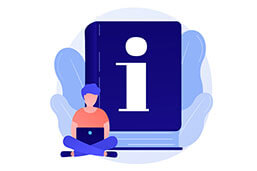
Information literacy is an imperative skill for critical thinking and academic work, empowering students to trace, assess, and utilize information productively. When working with sources, this skill becomes especially crucial, securing that one can distinguish credible resources from unreliable ones. From this article, you will gain a more profound understanding of what role information literacy plays in academic writing and why many educational institutions expect it from their students.
Definition: Information literacy
To put it simply, information literacy is a set of abilities that help students to locate, evaluate and cite various sources of information in an effective manner. People who have information literacy can gather useful information, use critical thinking to argue against or dispose of questionable information, and present information in a clear and rational way. These days, lots of academic research is carried out online. Therefore, digital literacy skills – the ability to research material from online sources critically and effectively – often help with information literacy. It is not just the ability to find and evaluate information from a library or printed publications.
Why information literacy is crucial?
Given that misinformation abounds online – and in print – the ability to differentiate accurate from inaccurate is important in all academic fields. Information literacy skills help with this differentiation. It helps students to determine for themselves whether fake news or dubious or outdated information is presented to them and, thus, whether they should cite it in an essay. It may also be crucial in helping filtering out academic studies that have been funded by commercial organizations to help promote a brand or outcome, for instance. Information literacy is the set of skills needed to identify such sources and to filter them out of the research.
Information literacy – Skill set
As mentioned before, information literacy is a set of skills, not a single process. These skills include:
- Finding reliable sources and ignoring unreliable ones.
- Adapting research strategies that are relevant to the subject matter.
- Evaluating information for relevance, credibility, and accuracy.
- Diversifying information gathering for a more rounded picture.
- Ensuring the information being used is from an ethical source that is legal to use.
- Taking a scholarly approach that analyses and represents information rather than merely regurgitating it.
Finding legitimate sources
A legitimate source can be found in academic works and research papers by looking in the bibliography – or Works Cited list– loacted at the end. The author of the information should have only used academically rigorous primary and secondary sources to which you can also turn. When you read them, always have in mind the reliability you grasp of each source you access.
When researching online, it is best to avoid tertiary sources as reliable sources of information. They can be handy for background research, but you should avoid citing them in your work. An unread bibliography on its own, an academic abstract, or an open-source encyclopaedia are all examples of tertiary sources. Use primary sources – that is to say, the records or information you are addressing – as much as possible. Secondary sources are also permissible, but only when they’re from respected sources, such as academic textbooks or peer-reviewed papers.
Note: Boolean operators are useful tools when searching for legitimate sources in a digital format, such as within academic websites, via search engines or from databases. They help to qualify searches to produce the most relevant results.
| Boolean operator | Result |
| AND | Results must include both search terms |
| OR | Results can include either search terms |
| NOT | Results must include one search term but not the other |
Evaluating sources
In information literacy, evaluating sources is a crucial skill. Students should be able to evaluate sources based on their intended audience, the original purpose of the material, whether the source is primary, secondary, or tertiary and how accurate – or otherwise – it may be. In addition, it is important to evaluate the quality and credibility of sources to work out how well-researched they might be and how much, if any, weight to give them. A reliable source is one that offers a reasoned argument based on strong evidence or established facts.
A CRAAP test is a way to evaluate sources in information literacy. This means assessing sources based on five criteria, namely their currency, relevance, authority, accuracy, and purpose.
numerous advantages for Canadian students:
- ✓ 3D live preview of your configuration
- ✓ Free express delivery for every order
- ✓ High-quality bindings with individual embossing

Citing sources
When an academic essay or research paper has been produced from well-evaluated sources, it demonstrates information literacy. However, these sources must be cited for them to stand up. As such, the correct form of citation is a crucial part of being information literate. Different educational institutions may have their preferred citation methodologies, such as APA style, MLA or Chicago style, among others. These are chosen so that students all adopt the same method, thereby making assessments between submissions easier. They all have particular pros and cons. From an information literacy perspective, the point is to make sure citations have been included.
FAQs
Information literacy is a set of skills that demonstrate you can research effectively, provide critical analyses of sources and reproduce information in a reasoned way.
Yes, it is particularly important in the humanities and arts courses where the ability to research widely and evidence the validity of sources will be a key skill.
Yes, it is also important to be able to evaluate information well in science, especially when discussing peer-reviewed research papers.
No, it isn’t. If you paraphrase the work of another writer, then be sure to cite them even if the words you use are your own.
